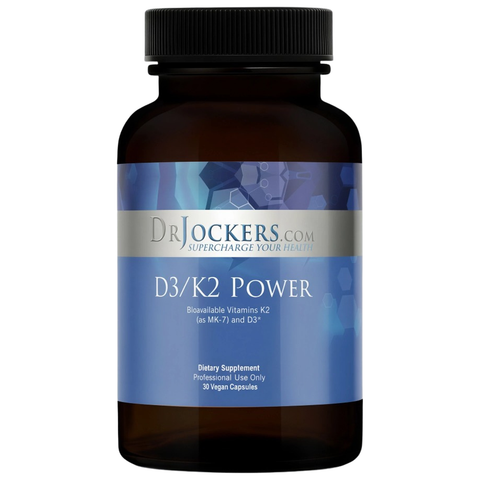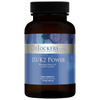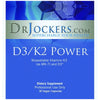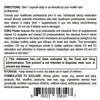
It is essential to maintain healthy vitamin D3 and K2 levels throughout all stages of life, from fetal development to old age. These nutrients help support a number of important systems in the body, including healthy bones, immunity and cardiovascular function.- Dr. Jockers
Let's discuss the key benefits of D3/K2 Power:

Why should I take D3/K2 Power?
Why is Vitamin D3 and K2 important?

Why does Dr. Jockers recommend D3/K2 Power?

A few years ago my doctor suggested that I take D3 with K2. I have been taking it ever since. But sometimes it is difficult to find. I was happy to find that Dr. Jockers carries it. I am very happy with the product. - Mary
Read our customer reviews and you'll see why our clients agree these are...
Supplements You Can
TRUST
D3/K2 Power

Vitamin D deficiency is a current epidemic in our society today, affecting 90% of the world`s population. According to Vitamin D expert Michael Holick, `We estimate that vitamin D deficiency is the most common medical condition in the world." It is clear that most people are not getting enough healthy sun exposure.
As a clinician, I see very serious health problems associated with long-term vitamin D3 deficiencies. Vitamin D3 deficiency will impact the development and stability of the immune system, the nervous system, and the endocrine system.

Why is Vitamin D important?
Vitamin D is a fat-soluble vitamin. It’s essential for many areas of your health, including immune health, bone health, muscle health, brain function, and mental health.
Vitamin D more resembles a hormone than a vitamin by function. Hormones are chemical messengers that interact with cell receptors to produce specific biological responses. Calcitriol, the active form of Vitamin D, is arguably the most powerful hormone in the body. It has the ability to activate over 1,000 genes, which is roughly 5-10% of the human genome.
Vitamin D3 is also shown to boost glutathione production in the neuronal cells and protect them from damage inflicted by oxidative stress. Vitamin D also helps to modulate the immune system to reduce inflammation throughout the body.

What are optimal Vitamin D levels?
Vitamin D3 levels are most often understated. In the medical world, levels below 32 ng/ml are considered sufficient.
However, much research has shown this level is only sufficient to prevent the development of rickets but not sufficient enough for optimal function (5).
Functional medicine doctors use the following ranges for optimal vitamin D3 levels.

Why is Vitamin K2 critically important?
Vitamin K1 is necessary for blood coagulation and is produced by green leafy vegetables. This form of vitamin K helps assist in the formation of anticoagulant factors, protein C & S.
Vitamin K2 is necessary to convert a critical bone-building protein called osteocalcin. Osteocalcin is a necessary protein that helps maintain calcium homeostasis in bone tissue.
Inadequate K2 inhibits osteocalcin production and reduces calcium flow into bone tissue. This leads to reduced bone mass and a weakened bone matrix.
Vitamin K2 is found in fermented grass-fed dairy, fermented soy (natto), and some fermented veggies.
Additionally, if one has leaky gut syndrome or a bad microbial balance in their gut (dysbiosis), they will be unable to synthesize enough vitamin K2.
Most people are not getting adequate vitamin K2 levels due to a diet deficient in fermented foods and the above-mentioned digestive challenges.
***Vitamin K2 works in synergy with vitamin D and magnesium to help improve calcium metabolism, immune, muscle, and mitochondrial function.

What is the importance of Magnesium?
Magnesium is an essential cofactor for vitamin D synthesis, and activated vitamin D, in turn, can increase intestinal absorption of magnesium and, therefore, can form a feed-forward loop to maintain its homeostasis.
Studies have suggested that magnesium could determine the number of vitamin D receptors; therefore, a deficiency in magnesium levels results in a reduced number of available vitamin D receptors in the target cells.
Additionally, magnesium also plays an important role in the conversion of the inactive form of vitamin D in the liver to 25-OH D3 and then into the active 1,25 calcitriol in the kidneys.
A magnesium deficiency would lead to poor uptake and conversion of D3 and symptoms associated with vitamin D3 deficiency.

What is the Synergy Between Vitamin D3, Vitamin K2, and Magnesium?
Too much vitamin D3 without the right amount of vitamin K2 and magnesium has been shown to be hazardous.
Vitamin D3 increases the demand for K2 and magnesium, as well as the potential to benefit through the bone building proteins osteocalcin and Matrix GLA protein (MGP).
These proteins activate calcium channels to pull calcium into the bone and out of soft tissue structures. Be sure to consume vitamins D3, K2, and magnesium together for optimal bone and cardiovascular health.

What is Unique About our D3/K2 Power?
We formulated D3/K2 Power to contain the optimal ratio of vitamin D3, vitamin K2, and magnesium for optimal cellular function and calcium metabolism.
This formula is the ONLY formula we are aware of that contains this ideal ratio of 5,000 IU of D3, 150 mcg MK-7 form of vitamin K2, and 120 mg of magnesium citrate in a highly absorbable form for optimal delivery of these key nutrients.
What is the recommended dosage?
Normal Dosage: 1 capsule daily with food (earlier in the day)
Advanced Dosage: 2 capsules daily with food (earlier in the day) for 30–90 days or as recommended by your health care practitioner.
When introducing a new supplement, we recommend taking the lowest dose for 2-3 days. As tolerated, increase the dose until you have reached the recommended normal or advanced guidelines. Reduce to a tolerable dosage if adverse effects occur.
“MK-7 supplements containing more than 50 mcg/d may interfere with oral anticoagulant treatment (blood thinners), whereas doses of at least 50 mcg are not likely to affect the INR value in a relevant way. (20)”
This supplement does contain 150 mcg of MK-7– so it is not to be used by anyone taking blood thinning treatments.
FAQs
What is the source for Vitamin D3 and Vitamin K2?
Select Your Options & Add to Cart
† These statements have not been evaluated by the Food and Drug Administration.
This product is not intended to diagnose, treat, cure or prevent any disease.









